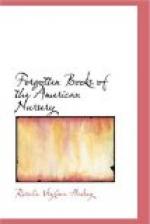“Goody Two Shoes is almost out of print. Mrs. Barbauld’s stuff has banished all the old classics of the nursery, and the shopman at Newbery’s hardly deigned to reach them off an old exploded corner of a shelf, when Mary asked for them. Mrs. Barbauld’s and Mrs. Trimmer’s nonsense lay in piles about. Knowledge insignificant and vapid as Mrs. Barbauld’s books convey, it seems, must come to a child in the shape of knowledge; and his empty noddle must be turned with conceit of his own powers when he has learned that a horse is an animal and Billy is better than a horse, and such like, instead of that beautiful interest in wild tales, which made the child a man, while all the time he suspected himself to be no bigger than a child. Science has succeeded to poetry no less in the little walks of children than of men. Is there no possibility of arresting this force of evil? Think what you would have been now, if instead of being fed with tales and old wives’ fables in childhood, you had been crammed with geography and natural history. Hang them! I mean the cursed Barbauld crew, those blights and blasts of all that is human in man and child."[142-A]
To Lamb’s extremely sensitive nature, the vanished hand of the literary man of Grub Street could not be replaced by Mrs. Barbauld’s wish to instruct by using simple language. It is possible that he did her some injustice. Yet a retrospective glance over the story-book literature evolved since Newbery’s juvenile library was produced, shows little that was not poor in quality and untrue to life. Therefore, it is no wonder that Lamb should have cried out against the sore evil which had “beset a child’s mind.” All the poetry of life, all the imaginative powers of a child, Mrs. Barbauld, Mrs. Trimmer, and Mr. Day ignored; and Newbery in his way, and the old ballads in their way, had appealed to both.
In both countries the passion for knowledge resulted in this curious literature of amusement. In England books were written; in America they were reprinted, until a religious revival left in its wake the series of morbid and educational tales which the desire to write original stories for American children produced.
FOOTNOTES:
[123-A] Miss Hewins, Atlantic Monthly, vol. lxi, p. 112.
[123-B] Brynberg. Wilmington, 1796.
[128-A] Miss Repplier, Atlantic Monthly, vol. lvii, p. 509.
[141-A] Hill, Johnsonian Miscellany, vol. i, p. 157.
[141-B] Ibid.
[142-A] Welsh, Introduction to Goody Two Shoes, p. x.
CHAPTER VI
1800-1825
Her morals then the Matron read,
Studious to teach her Children dear,
And they by love or Duty led,
With Pleasure read.
A Mother’s Remarks,
Philadelphia, 1810
Mama! see what a pretty book
At Day’s papa has bought,
That I may at its pictures look,
And by its words be taught.




